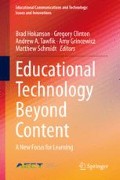Abstract
Two taxonomies of instructional goals (Bloom and Krathwohl, Taxonomy of educational objectives: The classification of educational goals, by a committee of college and university examiners. Handbook I: Cognitive domain. New York: David McKay Co, 1956; Gagné, The conditions of learning. New York: Holt, Rinehart, & Winston, 1965) are revisited, asking why the design community at large treats them as “received wisdom,” while at the same time their authors and colleagues treat(ed) them as unfinished business and continued to modify them. The question is raised as to the possibility of finding a resolution of their differences. The thesis is advanced that both consist of lower-level performances subordinate to and leading to skilled performance, which may supply a unifying principle. The proposition is advanced that we should look for ways of reconciling and integrating their differences. Using skilled performance as the superclass of both is suggested as a means of achieving this.
Presented at the AECT Summer Research Symposium 2018 July 16–17 Bloomington, Indiana. The author appreciates feedback from Brad Hokanson and the participants in the symposium review process on earlier drafts of this paper. Thanks for some wonderfully enlightening conversations, I have made changes. The errors that remain are mine.
Access this chapter
Tax calculation will be finalised at checkout
Purchases are for personal use only
Notes
- 1.
It is important to note that although Bloom used the term “taxonomy” in the title of his work, Gagné distanced himself from the term. Despite that, it has stuck anyway: “No particular reason exists to think of these five different learning outcomes as constituting a taxonomy or as having been derived for that reason” (Gagné, 1984, p. 384). Gagné preferred the phrase “useful categories of human performance” instead. This gives evidence to my thesis.
References
Amirault, R. J., & Branson, R. K. (2006). Educators and expertise a brief history of theories and models. In K. A. Ericsson, N. Charness, P. J. Feltovich, & R. R. Hoffman (Eds.), The Cambridge handbook of expertise and expert performance (pp. 69–86). Cambridge, UK: Cambridge University Press.
Anderson, L. W., Krathwohl, D. R., Airiasian, W., Cruikshank, K. A., Mayer, R. E., & Pintrich, P. R. (2001). A taxonomy for learning, teaching and assessing: A revision of Bloom’s taxonomy of educational outcomes: Complete edition. New York: Longman.
Bloom, B. S., & Krathwohl, D. R. (1956). Taxonomy of educational objectives: The classification of educational goals, by a committee of college and university examiners. Handbook I: Cognitive domain. New York: David McKay Co.
Bloom, B. S., Krathwohl, D. R., & Masia, B. B. (1964). Taxonomy of educational objectives: The classification of educational goals. Handbook 2 Affective domain. London: Longmans.
Bruner, J. (1970). The skill of relevance or the relevance of skills. Saturday Review of Literature, 53(14), 66–68. 78–9.
Chi, M. T. H., Glaser, R., & Farr, M. J. (1988). The nature of expertise. Hillsdale, NJ: Lawrence Erlbaum Associates.
Ericsson, K. A., Charness, N., Feltovich, P. J., & Hoffman, R. R. (2006). The Cambridge handbook of expertise and expert performance. Cambridge, UK: Cambridge University Press.
Gagné, R. M. (1965). The conditions of learning. New York: Holt, Rinehart, & Winston.
Gagné, R. M. (1970). The conditions of learning (2nd ed.). New York: Holt, Rinehart, & Winston.
Gagné, R. M. (1977). The conditions of learning (3rd ed.). New York: Holt, Rinehart, & Winston.
Gagné, R. M. (1984). Learning outcomes and their effects: Useful categories of human performance. American Psychologist, 39(4), 377–385.
Gagné, R. M. (1985). The conditions of learning (4th ed.). New York: Holt, Rinehart &, Winston.
Gagné, R. M., & Merrill, M. D. (1990). Integrative goals for instructional design. Educational Technology Research and Development, 38(1), 23–30.
Gibbons, A. S. (2014). Eight views of instructional design and what they should mean to instructional designers. In B. Hokanson & A. S. Gibbons (Eds.), Design in educational technology: Design thinking, design process, and the design studio. New York: Springer.
Glaser, R. (1966). Psychological bases for instructional design. AV Communication Review, 14(4), 433–449.
Harrow, A. J. (1972). A taxonomy of the psychomotor domain. New York: David McKay Co..
Krathwohl, D. R. (2002). A revision of Bloom’s taxonomy: An overview. Theory Into Practice, 41(4), 212–218.
Mager, R. F. (1962). Preparing instructional objectives. Belmont, CA: Fearon Publishers.
Merrill, M. D. (1994). A descriptive component display theory. In M. D. Merrill & D. G. Twitchell (Eds.), Instructional design theory (pp. 111–157). Englewood Cliffs, NJ: Educational Technology Publications.
Tyler, R. W. (1949). Basic principles of curriculum and instruction. Chicago: University of Chicago press.
Author information
Authors and Affiliations
Corresponding author
Editor information
Editors and Affiliations
Rights and permissions
Copyright information
© 2020 Springer Nature Switzerland AG
About this chapter
Cite this chapter
Gibbons, A.S. (2020). Unfinished Business: The Missing Skills. In: Hokanson, B., Clinton, G., Tawfik, A.A., Grincewicz, A., Schmidt, M. (eds) Educational Technology Beyond Content. Educational Communications and Technology: Issues and Innovations. Springer, Cham. https://doi.org/10.1007/978-3-030-37254-5_1
Download citation
DOI: https://doi.org/10.1007/978-3-030-37254-5_1
Published:
Publisher Name: Springer, Cham
Print ISBN: 978-3-030-37253-8
Online ISBN: 978-3-030-37254-5
eBook Packages: EducationEducation (R0)

